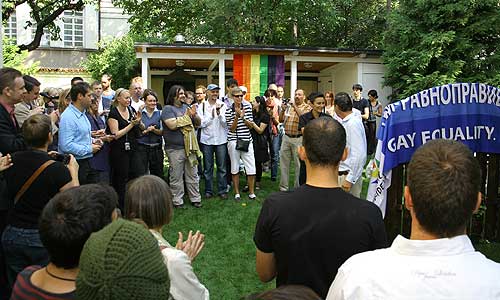by Rex Wockner

Swedish Ambassador Krister Bringéus held a 'mini-pride' at his suburban Belgrade residence Sept. 20 when the gay pride parade was canceled after Prime Minister Mirko Cvetkovic met with pride organizers and told them the police couldn't protect marchers from marauding thugs. From left, InterPride's Billy Urich from the U.S., Filippa Diamanti from Athens Pride and Anita Winter from Berlin. Photo by Andy Harley, UKGayNews.org.uk
International News Briefs
The Sept. 20 gay pride parade in Belgrade, Serbia, was canceled Sept. 19 under pressure from police and the government, who said they couldn't protect the marchers from thousands of violent anti-gay hooligans who planned to attack the event.
March opponents had covered walls in the city center with graffiti that said, "We will get you," "Death to faggots" and "Blood will flow," and had spoken openly to reporters about the planned assault.
Serbia had not had a gay pride parade since 2001, when dozens of marchers and police officers were injured by marauding neo-Nazis, nationalists and soccer fans.
The decision to call off the parade came after organizers met with Prime Minister Mirko Cvetkovic, who proposed moving the march away from the city center. Organizers rejected that idea.
"The message of equal rights is transmitted symbolically when a group on the margins is able to parade in the center of the capital," said organizer Dragana Vuckovic.
Belgrade's http://www.Queerbeograd.org denounced the "lack of cooperation on the part of (the) state and police to secure the event."
"This is after months of planning by the organizing team, and repeated assurances from government at all levels, the minister for minorities, and the Serbian premier and president, that the pride will be secured and protected," the Web site said.
"A full security study was commissioned more than three months ago by pride organizers and executed by the university defense department constructing a detailed strategy for all logistical possibilities to carry out pride safely with full instructions for how police would secure pride participants' entrance to the parade, their safety during the event and their ability to leave the event unmolested."
The European Parliament's Intergroup on Gay and Lesbian Rights was equally dismayed.
"This pride march should have been an important step forward for human rights in Serbia," said Intergroup President Michael Cashman. "Instead, by failing to guarantee the right to a peaceful demonstration for LGBT people, Serbia has shown that it is not ready to become a member of the EU (European Union)."
The European Region of the International Lesbian, Gay, Bisexual, Trans and Intersex Association (ILGA-Europe) said the debacle means the government has lost control of the city.
"Serbian authorities have given in to threats of violence from neo-fascist groups, sending a message that the center of Belgrade is controlled by a violent mob, not the government and the police," said Program Director Maxim Anmeghichean. "The events of the last few days demonstrate that the Serbian authorities should fill the legal gap by prohibiting and punishing incitement to violence."
Following the parade's cancellation, the Swedish ambassador quickly organized a "mini-pride" at his suburban residence. About 50 people attended.
"Pride is all about the message of tolerance," Ambassador Krister Bringeus told the group. "I am very sorry that pride didn't take place, but welcome to this small pride event."
Belgrade's first gay pride march, in what was then Yugoslavia, was attacked by hundreds of thugs from ultranationalist youth organizations, skinhead groups and soccer clubs on June 30, 2001.
The hoodlums kicked and beat the marchers and chanted, "Death to homosexuals." Police fired pistols into the air to chase the miscreants from the city's main square.










